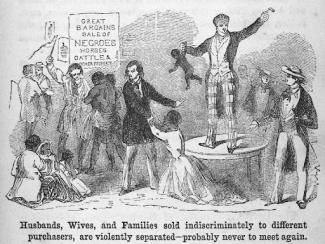
Black enslaved people typically spent the time between Christmas and New Year’s Eve joyously dancing, eating, and in community with their loved ones. Their enslavers gave them multiple days off to celebrate – but this act was far from kind. Many dreaded the days ahead.
January 1st was “Hiring Day,” which meant that many enslaved Black people were “rented out” by their enslavers. So what did it mean to be “rented out?” Frequently, being torn from their families.
A common and profitable practice in the pre-war South, enslavers would put enslaved people up for auction so the enslaver could make extra income during the period between cotton and corn harvests and the next planting season.
But like we’ve always done, enslaved people eventually turned their former New Year’s Day pain into a new tradition.
Since 1862, Black church communities have gathered on New Year’s Eve during what are called “Watch Night” services. The tradition started the night before the signing of the Emancipation Proclamation, and became an annual celebration of the freedom and perseverance of our people.
Although Black people still face oppression in various ways today, we deserve to start every new year off with hopeful and joyful spirits and in community with our people – just as our ancestors did!